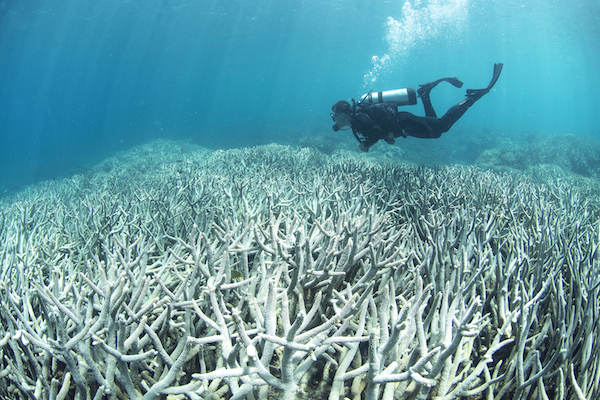While the world’s climate scientists wrestle with the mammoth issue of ocean acidification, the Turnbull government cuts research and fiddles in the margins.

Coral bleaching off Heron Island, near the southernmost point of the Great Barrier Reef, in February 2016. PHOTO XL Catlin Seaview Survey
In the week of Scott Morrison’s first budget, 330 scientists holed up in Hobart were focusing on something much bigger: an astonishingly rapid shift in global ocean chemistry.
The fourth international conference on “the ocean in a high-CO2 world” looked at how high carbon dioxide levels are affecting oceans and their inhabitants, and revealed some grim findings.
Carbon dioxide’s warming effect has been known for 150 years, but we knew virtually nothing about a second outcome of human emissions – rising acidity of ocean waters – until the early years of this century.
The extent and impact of ocean acidification is revealed in the scope of the Hobart conference: 218 presentations and 109 posters looking at the myriad ways seawater acidity is happening, affecting all marine life down to microscopic organisms, around all continents and in the deep ocean.
The most telling statistic about today’s ocean acidification is the rate at which it’s unfolding. Acidity has increased by 30 per cent in less than 100 years. That’s at least 10 times and more likely well over 20 times the rate of acidification in the last big event previously, 56 million years ago.
The Hobart meeting heard that today’s change may be the most rapid in 300 million years. Time, and plenty of it, is all-important if living things are to adapt. Quickly-changing ocean chemistry is exacerbating coral bleaching, depressing immune responses and making it harder for some organisms to form shells and other structures needing calcium.
The impact is especially severe when warming ocean water and marine pollution are added, affecting coastal shellfish farming and causing the Great Barrier Reef’s worst bleaching on record.
One of the world’s best-known climate scientists, Ken Caldeira of the Carnegie Institution, California – a co-author of the paper that first described ocean acidification in 2003 – told the Hobart meeting of the enormous challenge posed to science by a high-CO2 ocean.
He pointed out the exponential increase in research demands it had created, taking in multiple drivers, whole ecosystems and evolutionary adaptation over time, in an environment often hard to access and covering 70 per cent of Earth’s surface.
Both the conference as a whole and Caldeira’s closing address revealed the colossal absurdity of February’s statement by the chief executive of CSIRO, Larry Marshall, that the task of modelling, monitoring and measuring climate change was essentially finished. It’s barely begun.
Marshall’s “job done” line was the basis of his scheme to restructure parts of CSIRO, with climate research giving way to studying adaptive technologies. Between 10 and 50 marine science positions are to go; the actual number hasn’t yet been announced.
CSIRO is a world leader in modelling southern hemisphere climate. The threat to its climate science capacity was a dark cloud over the four days of the Hobart conference.
Treasurer Scott Morrison’s budget speech made no mention of climate or the environment, immediately compromising the Turnbull government’s much touted election manifesto, its 10-year “national economic plan for jobs and growth”. If our natural systems fail, the whole economy goes down too.
The budget does include money to protect the Great Barrier Reef, but the over-arching cause of our oceans’ sickness is too much carbon dioxide in the air. If we’re not pulling our weight to cut our own emissions – and we’re not – all the rest is fiddling in the margins.
There’s always hope. The centrepiece of Labor’s relatively ambitious climate plan – twin “baseline and credit” emissions trading schemes – offers a chance for much-needed bipartisan climate policy.
Such a scheme could be adapted by the Turnbull government as the “safeguard mechanism” to give bite to its toothless Direct Action policy. But that will now have to wait until after the election.
To its shame, the Coalition refuses to engage in meaningful discussion on climate. It’s a policy space that could be called a “barren” – the name given to desolate areas in coastal seas which have been swept clean of all life, mainly as a result of pollution.
As a US delegate to the ocean conference quipped in a discussion on winning over public opinion, “You can wake someone who’s asleep, but you can’t wake someone who’s pretending to be asleep.”
